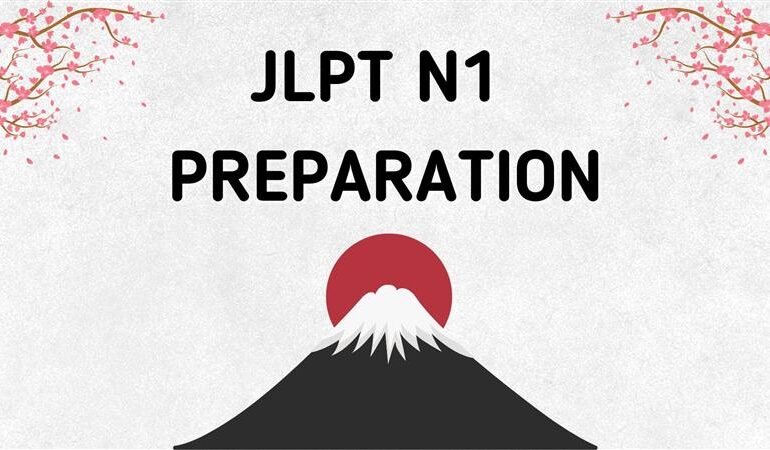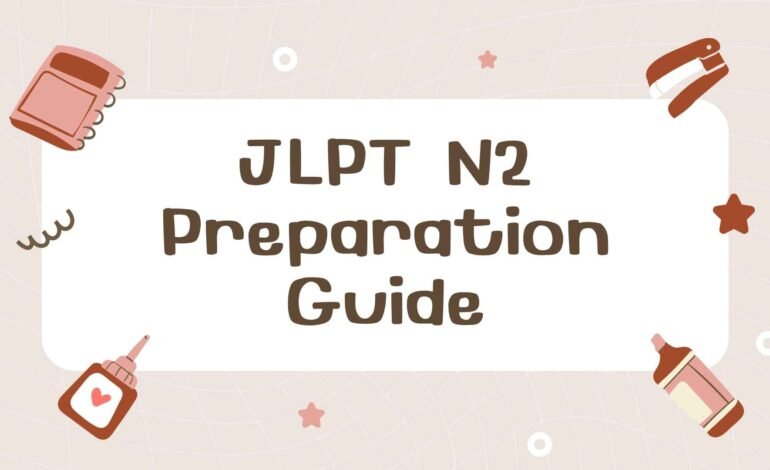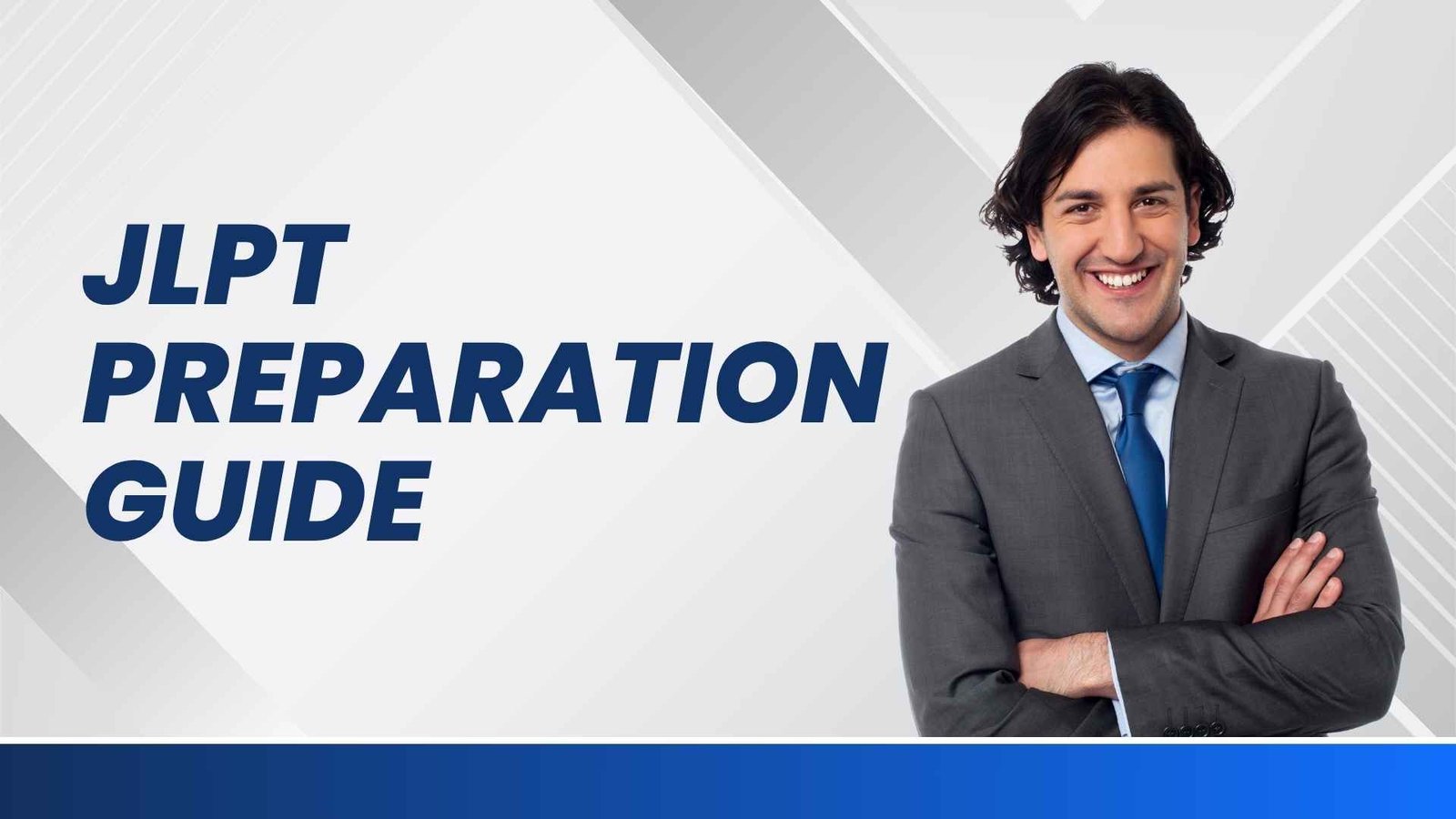
Achieving JLPT N1: Expert JLPT N1 Preparation Tips
The Japanese Language Proficiency Test (JLPT) is globally recognized as the benchmark for measuring Japanese language ability among non-native speakers. Among its five levels, JLPT N1 stands as the pinnacle — representing near-native fluency in reading, listening, vocabulary, and grammar comprehension. Achieving JLPT N1 is more than a certification; it’s proof that you’ve mastered one of the world’s most complex languages. It can open doors to higher education in Japan, career opportunities in multinational companies, and even permanent residency eligibility.
However, success at this level doesn’t come easily. The N1 test demands advanced skills in understanding complex sentence structures, abstract ideas, and nuanced tones — abilities developed only through long-term immersion and practice. Official Website
In this detailed guide, we’ll explore effective JLPT N1 preparation tips, time-tested study plans, and recommended materials to help you clear the exam with confidence. Whether you’re self-studying or preparing under expert guidance, this article will help you plan strategically and avoid common pitfalls.
For personalized JLPT N1 training and mentorship, connect with TLS – The Japanese Language School at +91 8700956038 or tls@teamlanguages.com.
Understanding the JLPT N1: Exam Format and Expectations
Before starting your preparation, it’s essential to understand what makes JLPT N1 unique.

The JLPT N1 test evaluates advanced Japanese skills — the ability to comprehend logic, reasoning, and opinion-based content. Unlike lower levels, N1 doesn’t test your memory; it tests your real understanding of language use in professional and academic settings. JLPT Exam 2025
Structure of JLPT N1
- Language Knowledge (Vocabulary and Grammar)
- Reading Comprehension
- Listening Comprehension
Each section tests a distinct skill, and all are equally weighted. To pass, you must achieve both an overall minimum score (100/180) and individual section thresholds.
The total test duration is about 170 minutes, and it demands focus, speed, and endurance. Therefore, your JLPT N1 study plan should integrate all three sections — not just vocabulary and grammar. JLPT N2 Preparation
How to Create an Effective JLPT N1 Study Plan
A solid study plan forms the foundation of your JLPT N1 journey. Without structured preparation and consistency, even the most recommended books or resources won’t guarantee success in the exam. JLPT Exam Result 2025
You’ll need at least 5–6 months of consistent preparation if you’ve already cleared N2, or around a year if you’re starting fresh.
Month-by-Month Breakdown
- Months 1–2: Focus on vocabulary and grammar foundation.
- Months 3–4: Start reading comprehension and listening exercises.
- Month 5: Take mock tests and identify weak areas.
- Month 6: Revision and test simulation.
Weekly Study Goals
| Area | Study Focus | Recommended Time |
| Vocabulary | Learn 150–200 words/week | 1 hour daily |
| Grammar | 5–10 new grammar points | 1 hour daily |
| Reading | 3–4 long passages | 1 hour daily |
| Listening | Podcasts and mock audio | 30–45 min daily |
| Mock Tests | Full-length practice | Once every 2 weeks |
Consistency matters more than speed. Even one hour a day is powerful if maintained long-term.
Building a Powerful Vocabulary Base
Vocabulary poses one of the toughest challenges in JLPT N1. The test includes advanced kanji compounds, idiomatic phrases, and formal expressions that are seldom encountered in everyday Japanese conversations. JLPT Registration
How to Approach the JLPT N1 Vocabulary List
- Use the JLPT N1 vocabulary list PDF and divide words by themes — business, education, society, and emotions.
- Learn using contextual reading — memorizing words from articles and novels helps retention better than flashcards alone.
- Use spaced repetition apps like Anki or Quizlet to revise older terms.
- Focus on synonyms and antonyms, as N1 questions often test word nuance.
Pro Tip:
Don’t just memorize meanings. Learn how words are used in context — for instance, subtle differences between similar verbs like “避ける (sakeru)” and “逃れる (nogareru).”
By mastering context, you’ll be able to handle tricky JLPT N1 questions that test word choice and tone.
JLPT N1 Grammar: Mastering Advanced Patterns
JLPT N1 grammar goes beyond memorizing forms. It focuses on nuance, implication, and context — understanding when and how certain expressions fit different social situations and levels of formality in Japanese. JLPT N3 Preparation Guide
Key Grammar Resources
- Shin Kanzen Master Grammar N1
- Try! JLPT N1 Grammar
- So-Matome Grammar N1
Study Approach
- Learn 5–8 grammar patterns daily.
- Write original sentences using each pattern.
- Review differences between similar-looking forms (e.g., ~ものの vs ~といえども).
- Practice grammar through JLPT N1 mock tests and 過去問 (past papers).
Advanced learners often underestimate grammar review, but JLPT N1 grammar questions are designed to test subtle differences. A thorough JLPT N1 grammar guide will help you recognize context cues during reading and listening.
Developing Reading Comprehension for JLPT N1
Reading comprehension is a major component of the JLPT N1 exam. You’ll encounter lengthy passages from newspapers, essays, and academic journals that test your ability to grasp context, infer meaning, and analyze complex sentence structures accurately.
Effective JLPT N1 Reading Practice Tips
- Start with short articles (NHK News Web Easy, Asahi Weekly).
- Gradually move to long, complex texts like essays and blogs.
- Highlight transition words and conjunctions (しかし, そのために, 一方で) — they signal logic.
- Practice under time constraints using JLPT N1 practice tests.
Focus on reading for meaning, not translation. The goal is to infer opinions, tone, and hidden implications. JLPT Exam 2025
Recommended Reading Materials
- Shin Kanzen Master Reading N1
- Speed Master Reading
- Japanese newspapers and novels
As you read, note down unfamiliar expressions and look for repeating kanji patterns — this boosts both vocabulary and comprehension speed.
Listening Comprehension: Understanding Fast and Natural Japanese
The JLPT N1 listening section is notoriously difficult due to its fast pace, diverse accents, and complex question patterns. It requires sharp concentration, quick comprehension, and regular practice with authentic Japanese audio materials. JLPT N4 Preparation
Types of Listening Questions
- Task-based comprehension – Understanding information to solve a problem.
- Summary comprehension – Identifying main ideas.
- Integrated comprehension – Following long dialogues.
- Quick response – Reacting to short phrases.
JLPT N1 Listening Practice Tips
- Listen daily to Japanese podcasts (NHK Radio, Teppei Podcast).
- Watch Japanese dramas or YouTube without subtitles.
- Use shadowing — repeating audio after hearing it — to improve rhythm and pronunciation.
- Take JLPT N1 mock tests in real exam conditions to build endurance.
If you can understand natural Japanese news or radio without much help, you’re close to JLPT N1 listening proficiency. JLPT Exam 2025
Practicing with JLPT N1 Mock Tests and Past Papers
Mock tests are essential for bridging the gap between preparation and real exam performance. They help you assess progress, build time management skills, and adapt to the JLPT N1’s structure, question style, and pressure effectively.
Why Mock Tests Matter
- Improve time management.
- Reveal weak areas early.
- Build mental endurance for the 3-hour exam.
- Familiarize you with the test structure.
Recommended Mock Test Sources
- Official JLPT practice books.
- Kanzen Master Mock Tests.
- Sou Matome series.
- Free online JLPT N1 practice test PDFs.
Analyze your results each time. Focus not only on incorrect answers but also on why you made those mistakes. Adjust your study plan accordingly.
Best Books for JLPT N1 Preparation
Selecting the right study materials can greatly streamline your JLPT N1 preparation. High-quality textbooks, vocabulary lists, and online practice resources ensure efficient learning and help you focus on areas that need improvement. JLPT N4 Exam Pattern
| Section | Recommended Books |
| Vocabulary | Shin Kanzen Master Goi N1, Sou Matome Vocabulary N1 |
| Grammar | Try! N1, Kanzen Master Grammar N1 |
| Reading | Speed Master Reading N1, Kanzen Master Reading N1 |
| Listening | Sou Matome Listening N1, Kanzen Master Choukai N1 |
These are widely used by top scorers and offer realistic exercises aligned with the JLPT N1 test.
Online Study Tools and JLPT N1 Study Material
Alongside traditional books, modern learners gain immense advantages from digital tools such as JLPT apps, online quizzes, flashcards, and audio resources that enhance retention and make studying more interactive and efficient. JLPT N5 Preparation
Useful Websites and Apps
- JLPT Sensei – Grammar and vocabulary guides.
- Wasabi Japanese – Grammar explanations with examples.
- 日本語の森 (Nihongo no Mori) – YouTube grammar and listening lessons.
- Anki – Flashcards with spaced repetition.
- Reddit r/LearnJapanese – Discussion forums for peer support.
Downloadable JLPT N1 PDFs are available on many platforms for offline study.
JLPT N1 Exam Strategy: How to Approach Each Section
A well-planned JLPT N1 exam strategy can significantly boost your overall score. By managing time efficiently, prioritizing question types, and focusing on accuracy over speed, you can perform more confidently and maximize your results on test day.
Key Strategies
- Vocabulary & Grammar: Skim through quickly; don’t get stuck on one word.
- Reading: Identify keywords, skip irrelevant details, and summarize mentally.
- Listening: Focus on the speaker’s intention rather than translation.
- Time Management:
- Vocabulary/Grammar – 25 minutes
- Reading – 60 minutes
- Listening – 35 minutes
Always attempt all questions; there’s no negative marking.
How to Stay Consistent and Motivated
Motivation often fades during long months of JLPT N1 preparation. To stay disciplined, set realistic goals, track progress, reward milestones, and immerse yourself in Japanese culture through movies, podcasts, or language exchange sessions.
- Study with a friend or group.
- Set daily micro-goals and reward progress.
- Watch Japanese movies or read manga to stay connected to the language.
- Read JLPT N1 success stories online to boost morale.
For professional mentorship and structured training, you can join TLS – The Japanese Language School, which offers targeted N1 courses designed by native instructors.
Contact: +91 8700956038 | Email: tls@teamlanguages.com
Common Mistakes to Avoid During JLPT N1 Preparation
Many JLPT N1 aspirants make common mistakes such as neglecting listening practice, cramming vocabulary without context, skipping mock tests, or ignoring weak areas. Avoiding these pitfalls ensures balanced preparation and boosts your chances of achieving a high score.
- Ignoring listening practice.
- Memorizing vocabulary without context.
- Skipping full-length mock tests.
- Relying solely on one textbook.
- Neglecting revision before the exam.
Avoid these, and your preparation will be more balanced and effective.
Advanced Japanese Learning Tips for JLPT N1
Once you’ve mastered the basics, start integrating Japanese into your daily routine. Watch Japanese news, read blogs, or join language forums to naturally absorb vocabulary, expressions, and sentence patterns beyond textbooks.
Immersive Learning Methods
- Watch Japanese TV and news without subtitles.
- Read novels and essays by Japanese authors.
- Write daily journals in Japanese.
- Participate in online Japanese discussions.
Such exposure builds natural fluency — something no textbook alone can provide.
Frequently Asked Questions (FAQs)
1. What is the best study plan for JLPT N1 preparation?
The best JLPT N1 study plan typically spans around 6 to 8 months of focused preparation, especially for those who have already cleared JLPT N2. Start by dedicating the first two months to mastering grammar and vocabulary — the foundation of the language. In the next two months, focus on reading comprehension and listening practice, using advanced Japanese sources like NHK or Asahi Shimbun. The final two months should be used for JLPT N1 mock tests, reviewing weak areas, and fine-tuning your exam strategy.
A structured plan keeps your progress measurable and prevents last-minute cramming.
2. Which books are recommended for JLPT N1?
Choosing the right books can make a huge difference in your JLPT N1 preparation. The most trusted series are:
- Shin Kanzen Master Series — for vocabulary, grammar, reading, and listening
- Sou Matome Series — for concise summaries and daily lessons
- Try! JLPT N1 Grammar Book — for practical usage of advanced grammar patterns
- Speed Master Reading and Listening Books — for time-based practice
These resources provide structured learning, realistic JLPT N1 practice tests, and detailed explanations that help you strengthen every section.
3. Is JLPT N1 difficult for non-native speakers?
Yes, JLPT N1 is challenging for non-native learners because it demands an advanced understanding of Japanese used in academic texts, business contexts, and real-life communication. However, with a well-organized JLPT N1 study plan, even non-native speakers can pass.
The key lies in daily immersion — reading newspapers, listening to Japanese podcasts, watching Japanese news, and practicing with past JLPT N1 mock test papers to become familiar with native speed and tone.
4. How many kanji are required for JLPT N1?
To pass the JLPT N1 level, you need to recognize around 2,000–2,500 kanji. These characters often appear in academic documents, business correspondence, and advanced texts. Regular review of kanji lists using apps like Anki or Wanikani can help you build and retain recognition effectively.
Additionally, try reading novels or newspaper articles daily to naturally reinforce kanji comprehension in different contexts.
5. What are the best online resources for JLPT N1 preparation?
Online learning has made JLPT N1 preparation much easier. Some of the best free and paid resources include:
- JLPT Sensei – Grammar explanations and example sentences
- Nihongo no Mori (YouTube) – Comprehensive N1 grammar video lessons
- Wasabi Japanese – Listening and conversation-based learning
- JGram – Community-driven grammar index
- Reddit JLPT Community – Peer discussions and shared JLPT N1 study materials
These sites provide mock tests, PDF downloads, and JLPT N1 sample questions to help learners practice regularly.
6. How can I improve my JLPT N1 listening skills?
Improving your JLPT N1 listening skills requires consistent exposure to natural spoken Japanese. Begin by listening to NHK podcasts or Japanese dramas with subtitles. Once you’re comfortable, remove subtitles and practice shadowing — repeating phrases as you hear them.
Dedicate at least 30 minutes daily to JLPT N1 listening practice and take timed listening mock tests weekly to adjust your comprehension speed.
7. What is the passing score for JLPT N1?
The JLPT N1 passing score is 100 out of 180 points, with minimum sectional scores required in all areas:
- Language Knowledge (Vocabulary & Grammar): 19/60
- Reading: 19/60
- Listening: 19/60
Even if your total score exceeds 100, failing to meet the sectional minimum in any area will result in an overall fail. Therefore, balance your preparation across all sections.
8. Can I pass JLPT N1 through self-study?
Yes, many candidates successfully pass JLPT N1 through self-study by following a disciplined plan.
The key ingredients include:
- Using structured materials like Shin Kanzen Master
- Practicing JLPT N1 mock tests regularly
- Joining online study communities for motivation
- Tracking progress weekly
However, joining a reputed institute like TLS – The Japanese Language School can help you with expert guidance and advanced JLPT N1 preparation tips to stay on track.
9. How can I stay motivated during JLPT N1 preparation?
Motivation often fluctuates during long preparation periods. To stay consistent:
- Set weekly goals and mark progress visually
- Reward yourself for small milestones
- Surround yourself with Japanese media — songs, anime, or dramas
- Read JLPT N1 success stories for inspiration
Studying with peers or enrolling in a guided course at TLS – The Japanese Language School can also help maintain accountability.
10. How to pass JLPT N1 on the first attempt?
To pass JLPT N1 on your first try, follow these strategies:
- Build a solid foundation in grammar and vocabulary early on
- Take JLPT N1 practice tests every 2 weeks
- Focus on time management during the test
- Review and correct errors after each mock exam
- Strengthen listening and reading comprehension with native materials
Consistency and smart planning are the keys to success.
11. How long does it take to prepare for JLPT N1?
If you’re starting from JLPT N2 level, about 6–8 months of intensive study is enough. Beginners, however, may need around 1–1.5 years of consistent effort.
Daily study of at least 3 hours — divided into grammar, reading, vocabulary, and listening — is ideal for steady progress.
12. What level of Japanese fluency does JLPT N1 represent?
The JLPT N1 represents advanced or near-native proficiency. Holders of this certificate can read and understand complex articles, essays, and discussions on abstract topics. They can also comprehend fast-paced conversations and formal Japanese used in workplaces and universities.
13. Which section is hardest in JLPT N1?
Many test-takers find the reading comprehension section the hardest due to long passages and nuanced meanings. Others struggle with listening, as the conversations are fast and context-heavy. The key is to build stamina through daily practice and exposure to authentic materials.
14. What are the best JLPT N1 grammar books?
The following grammar books are highly rated:
- Shin Kanzen Master Grammar N1 – In-depth explanation and exercises
- Try! JLPT N1 Grammar – Context-based examples and usage notes
- Sou Matome Grammar N1 – Summarized lessons for quick review
These resources ensure you master grammar forms used in actual JLPT N1 questions.
15. How can I improve my reading speed for JLPT N1?
To improve reading speed, avoid translating every sentence. Instead, focus on identifying key connectors like “しかし (however)” or “したがって (therefore)” that indicate logical flow.
Practice reading editorials, essays, and novels in Japanese daily. Timed JLPT N1 reading practice tests can also help build speed and comprehension.
16. How many words do I need to know for JLPT N1?
You should know approximately 10,000 to 12,000 Japanese words to succeed at JLPT N1. This includes vocabulary from N5 to N2 plus many specialized and abstract words.
Create flashcards, categorize words by topic, and review them using spaced repetition techniques for long-term retention.
17. Are there any free JLPT N1 practice tests online?
Yes, several platforms offer free JLPT N1 mock tests and PDFs, including:
- The official JLPT website (sample questions)
- JLPT Sensei (practice sets and vocabulary lists)
- Nihongo no Mori YouTube Channel
- JTest4You (practice quizzes)
Practicing with these will familiarize you with the exam format and question difficulty.
18. What are the benefits of passing JLPT N1?
Passing JLPT N1 can significantly enhance your career and educational prospects. It allows you to:
- Work for Japanese companies or in translation roles
- Apply for university programs in Japan
- Qualify for certain visa categories
- Demonstrate advanced proficiency for global opportunities
This certification is widely recognized by employers and academic institutions worldwide.
19. Should I take JLPT N2 before attempting N1?
Yes, it’s advisable to pass JLPT N2 before attempting N1. The N2 level provides a strong foundation in vocabulary and grammar essential for understanding the complex materials that appear in N1.
20. What kind of listening materials are best for JLPT N1?
For JLPT N1 listening practice, use:
- NHK News Podcasts – for formal listening
- JapanesePod101 – for conversational language
- Nihongo no Mori YouTube – for exam-style practice
- Anime and dramas – for contextual vocabulary exposure
Mixing formal and informal content improves comprehension flexibility.
21. Can I take the JLPT N1 exam online?
No, currently the JLPT test is conducted only offline at official test centers twice a year — typically in July and December. You’ll need to register through official JLPT organizations or partner institutions in your country.
22. How should I divide my study time for JLPT N1?
A well-balanced study schedule could be:
- Grammar & Vocabulary: 40%
- Reading Comprehension: 30%
- Listening Practice: 20%
- Mock Tests & Review: 10%
Adjust your time based on your strengths and weaknesses, and take regular JLPT N1 practice tests to assess improvement.
23. What are common mistakes students make in JLPT N1 preparation?
Common pitfalls include:
- Overemphasizing grammar while ignoring listening practice
- Neglecting timed mock tests
- Relying on translations instead of thinking in Japanese
- Starting preparation too late
Avoiding these mistakes will ensure steady progress and better results.
24. How can I memorize JLPT N1 vocabulary effectively?
To memorize efficiently:
- Use spaced repetition systems (SRS) like Anki or Quizlet
- Study in context using Japanese sentences
- Review a JLPT N1 vocabulary list PDF daily
- Practice reading to reinforce real-world vocabulary usage
Consistency and exposure are the real secrets to vocabulary retention.
25. What should I do one week before the JLPT N1 exam?
During the final week:
- Revise grammar summaries and vocabulary lists
- Take 1–2 full JLPT N1 mock tests
- Focus on weak points identified earlier
- Sleep well and eat healthily before the test day
Avoid overstudying in the last 24 hours. Relax and maintain confidence — your preparation will pay off.
Conclusion: From Preparation to Proficiency
Reaching JLPT N1 represents mastery of Japanese at a near-native level. It’s a journey of discipline, consistency, and curiosity.
By following these JLPT N1 preparation tips, building a realistic study plan, and practicing strategically, you’ll not only pass the exam but also achieve true language confidence.
If you prefer guided learning with native teachers, enroll in TLS – The Japanese Language School — a trusted institute for JLPT and professional Japanese courses.
Ready to achieve JLPT N1 success with expert guidance?
Enroll in TLS – The Japanese Language School for structured, result-driven preparation.Phone: +91 8700956038
Email: tls@teamlanguages.com





